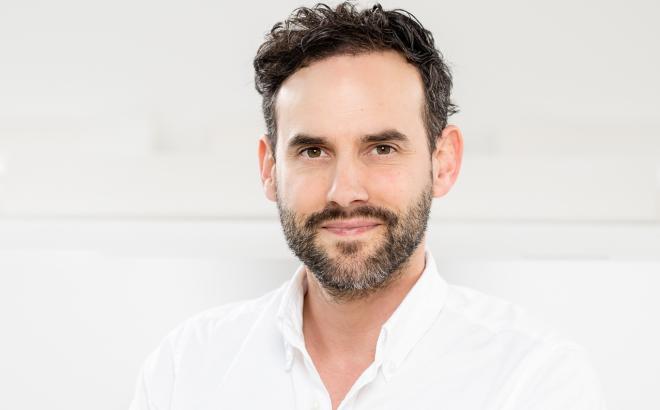Sascha Klee, Biostatistician
State-of-the-Art Data Management for Conclusive Research Results
“Biostatistics in the medical field is tricky because we work with people, in the human system. This is a tremendous difference to purely technical problems,” says Univ.-Prof. Dr.-Ing. Sascha Klee, head of the Biostatistics and Data Science Division at the KL.
Univ.-Prof. Sascha Klee has a clear goal in mind: He wants to provide a state-of-the-art analysis infrastructure to the researchers at the KL which offers systems for a sensible and usable data analysis and which will closely interlink data science and statistics in the future. “It is not possible to answer countless questions from a single data record as often requested by medical people. Nevertheless, we try to find possible solutions, which is a very challenging task,” the biostatistician explains. The scientist is not deterred by the extremely broad array of subjects which medical biostatistics has to cover at the KL due to their focus on diverse research topics. In future, his department shall be the point to contact for all aspects of data analysis living up to multifaceted requirements.
Supporting research projects in their data processing and data analysis can benefit from addressing a problem from different viewpoints. This is one of the professor’s strengths. Based on his education and career, he integrates views from other specialist areas.
Sascha Klee studies electrical engineering in Ilmenau in Germany and graduates in biomedical engineering. In his diploma thesis, he investigates special aspects of human eye stimulation. His love of research develops during that time and the budding scientist decides to start a career in the research sector. The research objectives regarding retina stimulation, purely technical in the beginning, are increasingly expanded by physiological questions from ophthalmology. For his doctorate in biomedical engineering in 2012, Ing. Klee closely cooperates with an eye specialist from the Free University of Berlin. This research work focuses on the selective colour channel stimulation of the human visual system. Questions of diagnostics are followed by questions of treatment. Since medical people repeatedly call for proofs of the effectivity of the applied technology, Klee starts to investigate in depth biostatistics and data science.
After graduating, Dr. Klee stays in the medical field dealing with ophthalmology. In 2016, he is appointed junior professor for optical electrophysiological medical engineering at the Carl Zeiss Foundation in Ilmenau and continues to work on diagnostic and therapeutic systems for the human eye. The intense collaboration with biostatistics during this time makes himself an expert in the field of data analysis. The job opportunity as professor for Biostatistics and Data Science in Krems advertised in 2021 reaches him at the perfect point in time in his career.
His path from electrical engineering to the field of biostatistics and data science went in a wide turn without having been planned in this way from the beginning. The research topic Prof. Klee currently focuses on is the result of his career as scientist, which is exactly what has made him the specialist expert he is today. Regarding his team, he also sets high value in multifaceted knowledge in the respective field which helps to analyse problems from different perspectives and overcome the communication discrepancy between statistics and medicine.
Next to his ambitious commitment to establish state-of-the-art systems of data management and biostatistics, Prof. Klee works in teaching to transfer biostatistical knowledge to students and medical KL staff. The eye remains his passion. At present, he works on a research project on preeclampsia together with senior physician Dr. Birgit Pfaller-Eiwegger from the University Hospital of Krems and in cooperation with the Technical University of Ilmenau, where he contributes his ophthalmological knowledge to investigate changes in the blood vessels at the ocular fundus as diagnostic markers. Together with colleagues from Hall, he aims at developing an individual medical device for static vascular analysis. An optical analysis of the retinal vessels at the ocular fundus shall detect vessel changes in time so that cardio-vascular diseases can be prevented. Univ.-Prof. Dr. Klee publishes innovative and state-of-the-art diagnostics and analysis methods as part of his editor activity together with researchers from Vienna and England.
Link to the KL research information system KRIS





